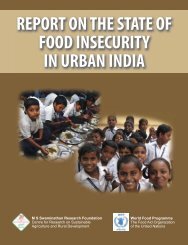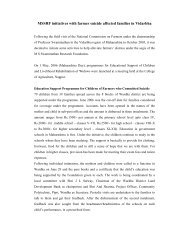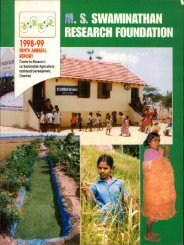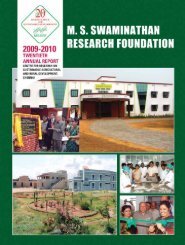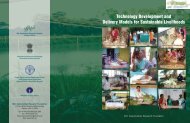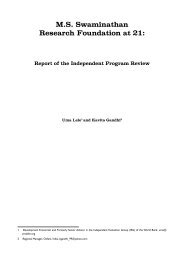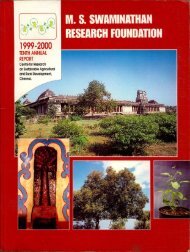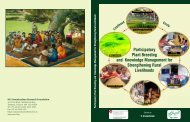06-bioresourcesstatu.. - M. S. Swaminathan Research Foundation
06-bioresourcesstatu.. - M. S. Swaminathan Research Foundation
06-bioresourcesstatu.. - M. S. Swaminathan Research Foundation
You also want an ePaper? Increase the reach of your titles
YUMPU automatically turns print PDFs into web optimized ePapers that Google loves.
Introduction<br />
Coastal ecosystems are transitional areas<br />
between marine and terrestrial ecosystems. Such<br />
areas include brackish water lakes/lagoons,<br />
marshes, mangrove swamps, littoral zones and<br />
coral reefs. Coastal ecosystems are among the<br />
most productive and biologically rich ecosystems<br />
on earth and are also the most endangered.<br />
Flood control, ground water recharge and<br />
discharge, shoreline stabilization, climate<br />
stabilization, carbon sequestrations are some of<br />
the major function and non-marketed values of<br />
Indian wetlands. Marketable resources such as<br />
timber, thatch, medicine, food, fodder and fuel,<br />
fish and aqua-culture, water spent and tourism,<br />
floodplain farming, culture and heritage, water<br />
supply, transport are some of the major market<br />
value of our wetlands.<br />
The livelihood strategies of millions of people in<br />
India are dependent on coastal ecosystems. Yet,<br />
they are one of the most neglected ecosystem<br />
with very little or no management inputs. Despite<br />
their important role in maintaining the ecology<br />
and economy of their regions, almost all coastal<br />
ecosystems in India are endangered by a lack of<br />
appreciation of their role. A few of the country's<br />
coastal ecosystems, which have a great deal of<br />
biological wealth are protected under the Wildlife<br />
Protection Act, whereas others, which may not<br />
be as biologically rich, do not share the same<br />
protection, and are easy targets for<br />
unsustainable development.<br />
In order to ensure that coastal ecosystems are<br />
managed in.a sustainable manner, there is a need<br />
to understand that coastal ecosystems are<br />
influenced by what happens. beyond the<br />
administrative boundary, an "Area of Influence<br />
Management" approach within the ecological<br />
boundary may be more acceptable. Local<br />
communities have evolved with the coastal<br />
ecosystems and are the best judges of resource<br />
management. Their time-tested traditional<br />
methods can only be utilized through their<br />
participation and economic returns going back to<br />
them. Without an economic value and<br />
participation, conservation of coastal bioresources<br />
will have no support, from local<br />
populations and will not survive.<br />
A great challenge in relation to the sustainable<br />
management of coastal areas in developing<br />
countries is the design of coastal development<br />
strategies which can lead to the ecological<br />
security of the coastal zone and the livelihood<br />
security of coastal communities becoming<br />
mutually reinforcing (<strong>Swaminathan</strong>, 1998). This<br />
necessitates the study of the coastal<br />
environment not only from the physico-chemical,<br />
biological and ecological bases but also through<br />
cultural, economic and social development<br />
National Bioresource Development Board<br />
(NBDB) since its inception, has initiated<br />
programmes with two main approaches I.e.<br />
resource-based approach and region-based<br />
approach. The Resource-based approach<br />
includes preparation of digitized inventories of<br />
bioresource I.e. plant, animal, microbial and<br />
marine. The Region-based approach aims to<br />
develop special programmes for critical areas of<br />
the country that is, the hill-ecosystem especially<br />
the north-eastern region, desert eco-system, and<br />
coastal and marine ecosystem. NBDB has also<br />
constituted expert committees to identify areas<br />
of research and intervention for conservation<br />
and sustainable utilization of bioresource.<br />
In a meeting of the coastal ecosystems experts<br />
working group in November 2000, it was<br />
suggested that an integrated programmes on<br />
inventorisation, characterization and<br />
enhancement of coastal bioresource be taken up<br />
in a network mode. The committee identified<br />
MSSRF to be the nodal agency for preparation of<br />
the status reports for selected coastal regions of<br />
the country.



